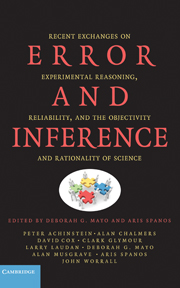 Error and Inference
Error and Inference Published online by Cambridge University Press: 29 January 2010
The Issues
There are at least two aspects to understanding: comprehensibility and veracity. Good explanations are supposed to aid the first and to give grounds for believing the second – to provide insight into the “hidden springs” that produce phenomena and to warrant that our estimates of such structures are correct enough. For Copernicus, Kepler, Newton, Dalton, and Einstein, the virtues of explanations were guides to discovery, to sorting among hypotheses and forming beliefs. The virtues were variously named: simplicity, harmony, unity, elegance, and determinacy. These explanatory virtues have never been well articulated, but what makes them contributions to perspicacity is sometimes apparent, while what makes them a guide to truth is obscure.
We know that under various assumptions there is a connection between testing – doing something that could reveal the falsity of various claims – and the second aspect of coming to understand. Various forms of testing can be stages in strategies that reliably converge on the truth, and some cases even provide probabilistic guarantees that the truth is not too far away. But how can explaining be any kind of reliable guide to any truth worth knowing? What structure or content of thoughts or acts distinguishes explanations, and in virtue of what, if anything, are explanations indications of truth that should prompt belief in their content, or provide a guide in inquiry?
To save this book to your Kindle, first ensure [email protected] is added to your Approved Personal Document E-mail List under your Personal Document Settings on the Manage Your Content and Devices page of your Amazon account. Then enter the ‘name’ part of your Kindle email address below. Find out more about saving to your Kindle.
Note you can select to save to either the @free.kindle.com or @kindle.com variations. ‘@free.kindle.com’ emails are free but can only be saved to your device when it is connected to wi-fi. ‘@kindle.com’ emails can be delivered even when you are not connected to wi-fi, but note that service fees apply.
Find out more about the Kindle Personal Document Service.
To save content items to your account, please confirm that you agree to abide by our usage policies. If this is the first time you use this feature, you will be asked to authorise Cambridge Core to connect with your account. Find out more about saving content to Dropbox.
To save content items to your account, please confirm that you agree to abide by our usage policies. If this is the first time you use this feature, you will be asked to authorise Cambridge Core to connect with your account. Find out more about saving content to Google Drive.